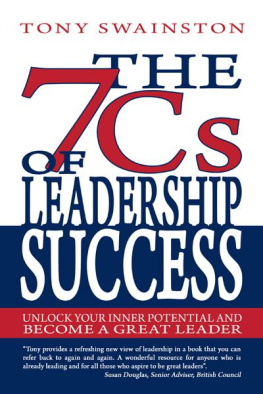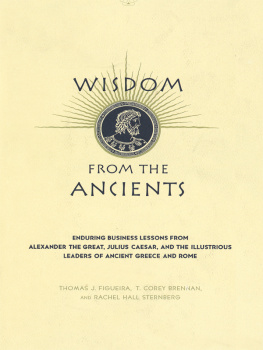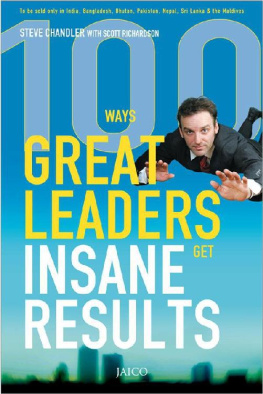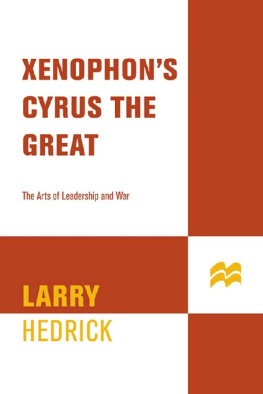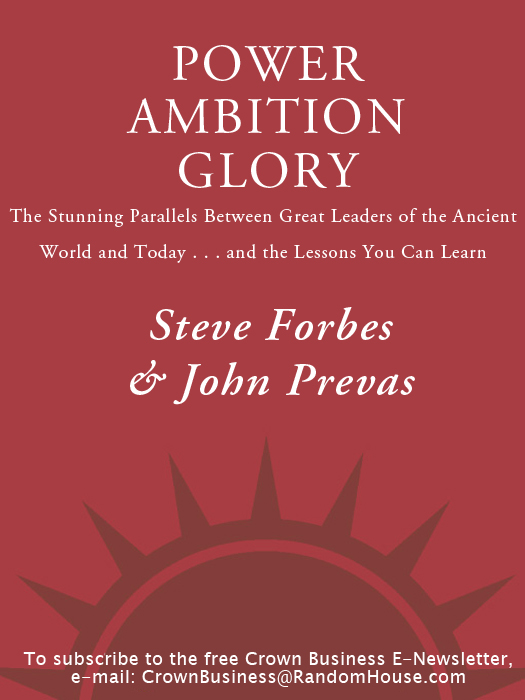Copyright 2009 by Steve Forbes and John Prevas
All rights reserved.
Published in the United States by Three Rivers Press, an imprint of the Crown Publishing Group, a division of Random House, Inc., New York.
Three Rivers Press and the Tugboat design are registered trademarks of Random House, Inc.
Originally published in hardcover in the United States by Crown Business, an imprint of the Crown Publishing Group, a division of Random House, Inc., New York, in 2009.
Library of Congress Cataloging-in-Publication Data
Forbes, Steve, 1947
Prevas, John, 1943
Power ambition glory / Steve Forbes and John Prevas.
1. LeadershipCase studies. 2. Power (Social Sciences)Case studies.
3. Civilization, Classical. I. Prevas, John. II. Title.
HD57.7.F665 2009
658.4092dc22
2008052008
eISBN: 978-0-307-45229-0
v3.1
T O L EILA AND W INSTON ,
FUTURE LEADERS
Steve Forbes
CONTENTS
1. THE PERSIAN EMPIRE: Cultural Diversity,
Self-Determination, and the Art of Making Money
Rem tene verba sequentur.
(Get hold of the matter and the words will follow.)
Cato
FOREWORD
by Rudy Giuliani
This is a complicated age for Americans. At times it feels like we are alone in history, suffering through a unique set of trials that leaders have never faced before. A book like Power Ambition Glory serves as a testament to the cycles of history and reminds us that nations and leaders have survived grave challenges. Its also a reminder that nations and leaders have overreached and failed. If the fragile balance of power, ambition, and glory is disrupted, then empires are lost.
The challenges we face today are certainly historic. The global economy is crumbling, and all of us are wondering how our new leaders will actually lead. Will they follow the example of a leader like Alexander the Great, whose grand vision was colored by an insatiable need for flattery? Will our leaders look to Cyrus, who boldly added to his vast empire but struggled to make all the far-flung parts function together in harmony?
It is the obligation of any leader to try to learn from the successes and failures of the past. In taking us on a fascinating tour of the principles, habits, styles, and results of leaders of the past, Steve Forbes and John Prevas draw clear lessons that todays readers can put to work in their own lives.
Reading this book, I was reminded of a problem I faced after I became mayor of New York City in 1994. Our tourism industry was on life support. No one wanted to drive into New York because they were accosted at the tunnels, and no one wanted to stay in New York because the hotel taxes were exorbitant. People who were inclined to spend money in New York Citymoney that would provide good jobs and support New York familieswere afraid of being confronted by a squeegee man wielding a filthy wiper and demanding a handout. And if they chose to stay overnight, they faced a hotel tax of 21.25 percenta burden that was about triple the average of the countrys busiest cities. The result was predictable. Businesses staged 50 percent fewer conventions in New York in 1993 than they had five years earlierthe Professional Convention Management Association in effect boycotted the city.
New Yorkers had been told that both these problems were intractable. The squeegee men supposedly had a right to wander into traffic and intimidate visitors. The hotel tax was high because the city and state desperately needed the revenue. My administration was determined to tackle both of these problems, not only to solve these two problems, but more important, to show New Yorkers that progress and reform were possible, that actual results could be achieved.
As one of my first actions as mayor, I sent a letter to the governor asking for a repeal of the states 5 percent hotel tax. And I cut the New York City tax from 6 percent to 5 percent. This was a small step, but important symbolicallyno one could remember any tax ever being reduced in New York City. Since the leader of any large enterprise cannot speak directly to each constituent, symbols are significant. I wanted to send a powerful message that I believed that lower taxes would stimulate more than enough business to offset any immediate loss in revenue. Thats exactly what happened with the hotel tax. Within months, net revenue from the hotel tax was actually higher at 5 percent than it had been at 6 percent, since far more visitors were coming to the city.
At the same time, we began to tackle the squeegee man problem. Estimates had generally placed their numbers at a couple thousand, but we had the police study the situation; we were astonished to discover that they identified only about 180. Rather than tangle with First Amendment issues, we took the noveland fully legalapproach of ticketing these men for jaywalking. After all, running in between moving cars was dangerous for drivers and for the squeegee men themselves. In the process they were identified and often found to be wanted for other violations and crimes. They were removed, and that very visible success set the stage for a series of dramatic improvements in New York City. An early victory set the tone for the next eight years.
More than most authors, Steve Forbes understands the power of symbols. As the leader of one of the publishing worlds great brand names, Steve understands that large organizations must set clear goals and hold themselves accountable. If someone representing Forbes does something irresponsible, then to the publicand to the rest of the Forbes organizationit is as though the action were made by Forbes itself.
By the same token, a powerful idea can be broadly transmitted by a leader, who can use his position to communicate ideas throughout the organization. Steve Forbes himself has been a forceful advocate of the idea that the American tax code is far too complicated and has greatly strayed from its revenue-collection mission, becoming a force for social engineering. In communicating that ideaand offering a postcard-sized alternativeSteve entered the public debate and emerged as a leader of the movement to make taxation fairer and simpler.
John Prevas also exhibits impressive initiative. By going into the field, John frequently observes one of my principles of leadershipsee things for yourself.
For example, there had been a centuries-long controversy over what route Hannibal took over the Alps. John actually explored the various possibilities, and in his book on Hannibal made an incontrovertible case as to the route Hannibal actually used. John has also visited various parts of the world that were the old stomping grounds of Alexander and other figures of classical times. Some of these areas are not particularly hospitable to Americans, yet John found ways to see what needed to be seen to help understand the past.
Leaders set the tone for those under their sway. Their priorities must be established and communicated if they are to achieve the support of the people they hope to lead. It is too soon to tell what will happen in our country as we enter a time of new leadership and unprecedented economic turmoil. Power Ambition Glory serves as a remarkable historical guide. Its both a reference guide to the rise and fall of empires, as well as a fresh look at modern business leaders and how they fit into the framework of history.



